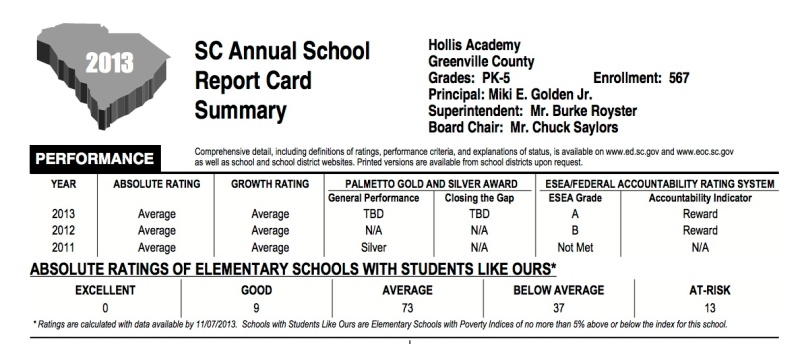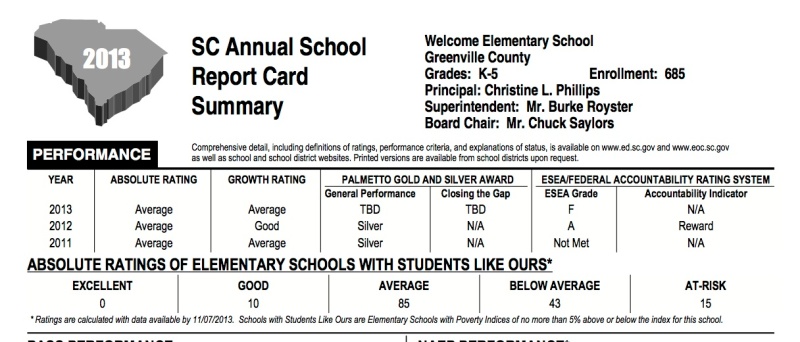Radical Scholarship: The Politics of Misinformation in Education Reform
Appointed and elected officials related to education have some important characteristics in common. Consider U.S. Secretary of Education Arne Duncan and South Carolina Superintendent of Education Mick Zais.
Neither have experience or education in the field of K-12 education, despite their primary responsibilities being related to K-12 education.
And because of their appointed (Duncan) or elected (Zais) position, they have a primary and nearly unchallenged voice in both the narratives about education and the policies implemented in public schools.
As well, since they have that access, Duncan and Zais often conduct tours and speeches promoted as informational or celebratory, but always use those masks to achieve something quite different: driving a set of ideologies and narratives that are mostly misinformation.
Superintendent Zais has been touring SC under the guise of celebrating successful schools in the state, but at each stop, he, instead, offers passive-aggressive and unsubstantiated claims directed less at the schools he appears to be praising than at other schools, teachers, and students.
Zais presents this pattern of misinformation in a commentary for The Greenville News (21 March 2014), which begins:
I am writing to set the record straight about public education in South Carolina.
The opening points made by Zais focus on his claim that funding and poverty levels are not the key determining factors in how successful schools are. To make that case he identifies two schools directly:
In Greenville County School District, Hollis Academy Elementary School has a poverty rating of 99 percent and received a grade of 97 percent, an A, on their federal report card. It’s one of the highest performing elementary schools in South Carolina. Welcome Elementary School is also in Greenville County. It has virtually identical demographics and received a grade of 47 percent, an F, on their report card.
Hollis Academy Elementary School (99.48 PI) and Welcome Elementary School (98.32) as high-poverty schools in the same school district (Greenville County) do appear to make Zais’s case, except he fails to identify the SC school report card data—ones that provide an important metric, “schools like us.”
On the 2013 school report cards (issued by the SC Department of Eduction which Zais heads), Hollis Academy Elementary School receives an absolute rating of “Average,” which is essentially typical of “schools like us” (Excellent, 0; Good, 9; Average, 73; Below Average, 37; At-Risk, 13):
On the same report card, Welcome Elementary School receives an absolute rating of “Average,” which is essentially typical of “schools like us” (Excellent, 0; Good, 10; Average, 85; Below Average, 43; At-Risk, 15):
Two points must be highlighted, if we seek to set the record straight: Hollis and Welcome are relatively similar in their composition and their outcomes; however, as the data above suggests (the numbers are different, note, in the range of “schools like us”), Hollis and Welcome are not identical in populations served.
Thus, the only way Zais can make his case is to cherry-pick data, conveniently omit data, and then make a really mean-spirited claim for which he offers no data:
The difference between high poverty schools that are excelling and those that are failing is neither funding, the education level of the parents, nor demographics. It’s the competence of the adults in the system. Where schools have capable principals and effective teachers, poor kids will learn.
The sweeping claims made by Zais, however, are not supported by the research base—and not once does Zais offer any evidence from research showing that “competence of the adults in the system” is a determining factor in student outcomes. Not once (notably because such evidence doesn’t exist).
Teacher quality (and VAM advocacy), “more with less,” funding doesn’t matter, and X practices and/or teacher quality can add “days of learning” or “years of learning”—all of these claims have been debunked:
- Estimated Versus Actual Days Of Learning In Charter School Studies
- Does Money Matter in Education?
- Do Top Teachers Produce “A Year And A Half Of Learning?”
- More with Less or More with More & Why it Matters!
- Review [UPDATED]: “How to Evaluate and Retain Effective Teachers” (League of Women Voters of SC)
Just as Duncan has continued a legacy among recent USDOE Secretaries of Education (Paige, Spellings), Zais represents the politics of misinformation in education reform that exposes our appointed and elected education officials as either incompetent or dishonest—neither quality suggesting that they should be driving our education narratives or policies.
This blog post has been shared by permission from the author.
Readers wishing to comment on the content are encouraged to do so via the link to the original post.
Find the original post here:
The views expressed by the blogger are not necessarily those of NEPC.


